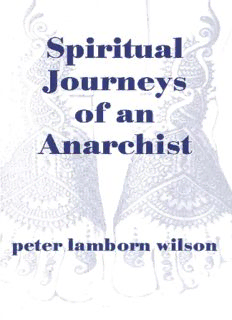
Spiritual Journeys of an Anarchist PDF
Preview Spiritual Journeys of an Anarchist
pe-erl aJDbornw ilson I Spiritual Journeys This work is licensed under the Creative Commons Attribution- N oncommercial 3.0 Unported License. https:/ I creativecommons.org Ardent Press, 2015 Published by Aragorn Moser Layout by Leona Benton Printed at "The Compound" 1818 Carleton St. Berkeley, CA 94703-1908 Autonomedia autonomedia.org pobox 568 Brooklyn NY 11211-0568 Spiritual Journeys of an Anarchist Peter Lamborn Wilson Sacred Drift: Summer Camp and Hobo Poetics TalkinRga venA :J ournaolfI maginaTtirovueb lVeol,. 4 , #1, Summer Solstice 1994 The Caravan of Summer GnosiAs J:o urnaolft heW esteIrnn neTrr aditNio.o 3n9s, Spring 1996 (p. 39-43) My Summer Vacation in Afghanistan FiftEhs taVtoel. 37 #'2 (357) Summer '200'2 (p. 15-'20) Roses and Nightingales Fifth EVsolt. 3a8t Neo . 4 (363) Winter '2004 (p. 43-47 ) Grange Appeal An earlier version of this essay appeared in FifEtsht ate, Spring '200'2. Thanks to Sunfrog and the Editorial Collective. Thanks also to Stephen C. Coye, New York State Grange Historian, and to the Clintondale New York Grange; and to Reed Bye, Chris Harp and Joel Kovel. Also Salvatore Engel-Di Mauro. Summer Camp & Hobo Poetics interview by Antero Alli I The Caravan of Summer .9 My Summer Vacation in Afghanistan z.9 Roses and Nightingales S3 Grange Appeal 69 1994 interview with High Times 113 Summer Camp & Boho Poetics an interview by antero alli Author of Scandal, and his recent collection of "essays on the margins of Islam" Sacred Drift (1993; City Lights Books, SF CA) Peter Lamborn Wilson5 written work shows scholastic rigor married to a poetics ef anarchy. A se!f-d�fined "comparative religionist", Wilson sifts enigmatic Islamic memes through semantic and philosophical sieves of Western culture. We spoke briefly on the afternoon of May 23, 1994, by telephone between his place in New York and mine, in Port Townsend. After ribbing me about what he thought was Seattle5 current state ef morbidity, I had to laugh. It5 true; there seems to be a down mood around town. Or is that just the way it always is and I'm just now noticing it? In the confusion of the moment, I ask him a safe question about his recent book. AnteroAlli: In your recent book, Sacred Drift (reviewed in Talking Raven; vol. 3, #3) I enjoyed the way you transferred certain memes from Islamic cultures and applied them to Western language and customs. Of these, what can you say about nomadism in particular? Peter Lamborn Wilson: There's a thesis I develop in the last chapter about a kind of sacred nomadism, a factor in Islamic culture and even � I in religion, as far as symbolism is concerned. The prophet himself was not a nomad per se but had a wanderer's life to a large extent. The very basis of the religion is, what you might say, based on a journey from Mecca to Medina and the triumphant return to Mecca, in the making of a pilgrimage. This pilgrimage preserves this constant movement within the Islamic world which is also crisscrossed with all sorts of other traveling concepts to lesser shrines, the whole image of the caravan; the desert as sea. When you add all this up you find the Islamic culture is permeated with nomadism in the anthropological sense of the term, as well as a sacred nomadism. Sociologically, Islam is understood as a culture for being at least half-nomadic. As I mention in the book, I think within every sedentary Moslem there's a nomadic Moslem trying to get out. AA: Did you write Sacred Drift, in part, to encourage nomadism in America? PLW: It's not so much encouragement as the fact (that's been noticed by plenty more people than me) that "nomadism" has reappeared in Western culture. After a period of sedentarism followed by a period of imperial expansion, the urge to move has turned inward in Western societies so that nomadism has reappeared. Everything from the average American changing homesites nine, ten, summer camp and hobo poetics eleven times (or whatever it is now) in a lifetime to continually changing jobs to the retirees on the road with their RV caravans to the hippies' old vans and rainbow buses. The homeless are, in fact, a kind of forced nomadism; nomadism as victimization. What is tourism?! Tourism is a kind of malignant or inverse nomadism. AA: Tourism as temporary weekend nomadism. PLW: Yeah. Our whole society is permeated with a very badly understood return of the nomad. It's necessary to throw some light on this and draw out the best possible features that might exist within it, the most liberatory aspects of it. AA: Liberatory aspects. Like what? PLW: In the essay Sacred Drift, I concentrated on intentional travel in Islam. This is where travel becomes an exercise of the spiritual will, where you travel on the face of the earth according to signs and wonders. Move through a world of the imagination which coincides with the "real world." This is an aspect of travel that is only potentially present in the West. It needs to be drawn out and emphasized. I've often wondered if today's homeless could develop a theory of their situation that emphasizes some "sacred" aspect of being without a home, in effect, like the way the old hobos did. The hobos made an adventure of it, made a virtue out of necessity by exercising their � 3
Description: